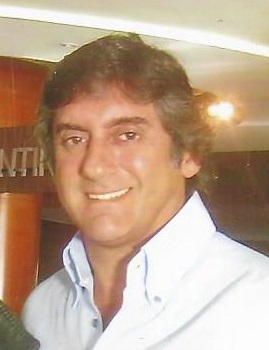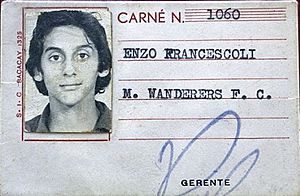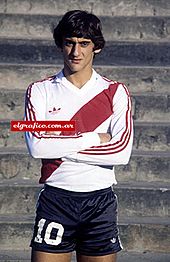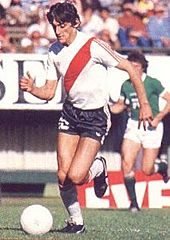Enzo Francescoli facts for kids

Francescoli in 2007
|
|||||||||||||||||||||||||||||||
| Personal information | |||||||||||||||||||||||||||||||
|---|---|---|---|---|---|---|---|---|---|---|---|---|---|---|---|---|---|---|---|---|---|---|---|---|---|---|---|---|---|---|---|
| Full name | Enzo Francescoli Uriarte | ||||||||||||||||||||||||||||||
| Date of birth | 12 November 1961 | ||||||||||||||||||||||||||||||
| Place of birth | Montevideo, Uruguay | ||||||||||||||||||||||||||||||
| Height | 5 ft 11+1⁄4 in (1.81 m) | ||||||||||||||||||||||||||||||
| Position(s) | Attacking midfielder, forward | ||||||||||||||||||||||||||||||
| Youth career | |||||||||||||||||||||||||||||||
| Wanderers | |||||||||||||||||||||||||||||||
| Senior career* | |||||||||||||||||||||||||||||||
| Years | Team | Apps | (Gls) | ||||||||||||||||||||||||||||
| 1980–1982 | Wanderers | 74 | (20) | ||||||||||||||||||||||||||||
| 1983–1986 | River Plate | 113 | (68) | ||||||||||||||||||||||||||||
| 1986–1989 | RC Paris | 89 | (32) | ||||||||||||||||||||||||||||
| 1989–1990 | Marseille | 28 | (11) | ||||||||||||||||||||||||||||
| 1990–1993 | Cagliari | 98 | (17) | ||||||||||||||||||||||||||||
| 1993–1994 | Torino | 24 | (3) | ||||||||||||||||||||||||||||
| 1994–1997 | River Plate | 84 | (47) | ||||||||||||||||||||||||||||
| Total | 510 | (198) | |||||||||||||||||||||||||||||
| International career | |||||||||||||||||||||||||||||||
| 1982–1997 | Uruguay | 73 | (17) | ||||||||||||||||||||||||||||
|
Medal record
|
|||||||||||||||||||||||||||||||
| *Club domestic league appearances and goals | |||||||||||||||||||||||||||||||
Enzo Francescoli Uriarte (born November 12, 1961) is a famous Uruguayan former football player. People often called him "El Príncipe" (which means "The Prince"). He played as an attacking midfielder or forward. Many consider him one of the best playmakers of his time. He is also seen as one of Uruguay's and South America's greatest players ever.
Francescoli played for his country in two FIFA World Cups, in 1986 and 1990. He also helped Uruguay win the Copa América three times: in 1983, 1987, and 1995.
At the club level, Francescoli started his career with Wanderers in Uruguay. He then moved to Argentina to play for River Plate. He was a top scorer and a key player when River Plate won their second Copa Libertadores title. He won five Argentine league titles with River Plate during his six years there.
He also played successfully in France for Racing Paris and Marseille. His great performances helped Marseille win the 1989–90 French Division 1 title. Later, he played in Italy for Cagliari and Torino. He then returned to River Plate, where he finished his amazing career.
Francescoli was a very important player for the Uruguay national team. He played 73 games for Uruguay between 1982 and 1997. At that time, he was the player with the most international appearances for Uruguay.
In 2004, the legendary player Pelé included Francescoli in his FIFA 100 list. This list featured the world's greatest living footballers. He was also named the sixth-greatest Uruguayan player and the 24th greatest South American player of the 20th century.
Contents
Early Life and Nicknames
Enzo Francescoli was born in Montevideo, Uruguay. His family had roots in Italy and the Basque region. From a young age, he was known for being quiet and observant. People who knew him described him as very kind, both on and off the field. Because he was quite thin, he was sometimes called "El Flaco" (meaning "The Skinny One"). His elegant way of playing and behaving later earned him the nickname "El Príncipe" ("The Prince").
Club Football Journey
Starting with Montevideo Wanderers

As a young boy, Francescoli was a fan of Peñarol, a big club in Uruguay. He tried out for them but didn't join because he felt he wouldn't get enough playing time. He also had a successful try-out with River Plate, a club he would join later. However, he chose to stay with his high school football team, where he won five championships.
After finishing high school, he joined his hometown club, Montevideo Wanderers. In 1980, he made his debut with their first team. They finished second in the league, which was their best result since 1931. He started chewing gum during games to avoid a dry mouth, a habit he became very dependent on.
In 1981, Francescoli played very well for Wanderers. The team finished third in the Uruguayan league. In February 1982, he played his first game for the Uruguay national team. Later that year, he made his debut in the Copa Libertadores, a major South American club tournament.
Joining River Plate
After winning the 1983 Copa América with Uruguay, River Plate signed Francescoli for $310,000. In 1984, he started to show his talent more. He played more often as the team reached the Argentine final, though they lost. Still, Francescoli was voted the best South American footballer of 1984. He turned down an offer from América de Cali, a team that was doing very well at the time.
In 1985, even though River Plate didn't win the championship, Francescoli was named Argentina's best player. He was the first foreign player to receive this honor. He finally won the Argentine title with River Plate in the 1985–86 season. He was the top scorer with 25 goals. In January 1986, he scored a famous bicycle kick goal against the Poland national team in a friendly match.
After winning the Argentine title, Francescoli moved to Europe. He joined Racing Paris in France.
Playing in France: RC Paris and Marseille
Francescoli started his European career with Racing Paris in 1986. The team had been struggling but was trying to improve. In his first season (1986–87), he scored 14 goals, making him one of the league's top scorers. The team finished 13th.
Francescoli became a fan favorite. In 1987, he was named the best foreign player in France. He continued to be the club's top scorer for three seasons. During this time, he received an offer from Juventus in Italy, but he chose to stay in France. Racing Paris later faced financial problems and left the French League.
In 1989, Francescoli moved to Marseille. He played only one season there but it was a successful one. He helped Marseille win the 1989–90 French Division 1 title, scoring 11 goals. He also helped them reach the semi-finals of the 1989–90 European Cup. His performances at Marseille caught the eye of a young Zinedine Zidane, who would later become a football legend himself.
Time in Italy: Cagliari and Torino
After the 1990 FIFA World Cup, Francescoli moved to Italy to play in the Serie A. He joined Cagliari along with two of his Uruguayan teammates. He found it a bit hard to settle in at first, playing in a deeper midfield role. Cagliari fought against relegation in his first two seasons, but they managed to stay in Serie A.
His third season in Italy (1992–93) was his best. Cagliari finished in a surprising sixth place in Serie A, earning a spot in the UEFA Cup. Francescoli scored seven league goals that season. He is considered one of Cagliari's greatest players and is in their Hall of Fame.
In 1993, Francescoli joined Torino. He came close to winning a trophy with Torino in the 1993 Supercoppa Italiana final, but they lost. Torino also reached the quarter-finals of the 1993–94 European Cup Winners' Cup. Despite a good season for the team, Francescoli scored only three goals in 24 games, his lowest in Italy.
Returning to River Plate and Retirement
In 1994, at 33 years old, Francescoli decided to return to River Plate in Argentina. He wanted to prove he could still play at the highest level. He performed very well, helping River Plate become undefeated champions in the Apertura championship that year.
In 1995, he was voted South American Player of the Year and Argentine Player of the Year again, ten years after his first time. In 1996, Francescoli led a young and talented River Plate team to win the 1996 Copa Libertadores title. This was a huge achievement.
River Plate then played in the 1996 Intercontinental Cup final against Juventus from Italy. They lost the match. It was in this game that Zinedine Zidane, who was playing for Juventus, met his idol Francescoli. Zidane later said, "when I saw Francescoli play, he was the player I wanted to be." Zidane even named one of his sons Enzo after him.
In 1997, River Plate continued their success, winning the Clausura, Apertura, and Supercopa Libertadores titles. Francescoli decided to retire in early 1998 due to ongoing injuries. His last two matches for River Plate were historic, as the team won two titles in four days.
On August 1, 1999, Francescoli had a friendly farewell match at River Plate's stadium. Sixty-five thousand fans came to see him. After his retirement, River Plate struggled for a while. Francescoli is still the club's seventh all-time leading goalscorer with 115 goals.
International Career Highlights
In 1981, Francescoli was part of the Uruguayan team that won the 1981 South American U-20 Championship. He was seen as one of the best young players in the world. He made his debut for the senior national team in 1982. In 1983, he scored his first international goal in a 2–0 win against Brazil in the Copa América.
World Cup Appearances
Uruguay qualified for the 1986 World Cup. Francescoli scored one goal in the tournament, but Uruguay's performance was not great. They were eliminated in the round of 16 by Argentina, who went on to win the World Cup. Francescoli later said this was his worst performance.
In his second World Cup in 1990, Francescoli again didn't perform as well as hoped. Uruguay advanced to the second round but lost to host nation Italy in the round of 16. This was Francescoli's last World Cup. He played in eight World Cup matches in total.
Copa América Success
The disappointment of the 1986 World Cup was eased when Uruguay won the 1987 Copa América. Francescoli played brilliantly in the semi-final against Argentina. Uruguay then beat Chile in the final, winning their 13th continental title.
In the 1989 Copa América, Uruguay reached the final again, but lost to Brazil.
In 1995, Francescoli led Uruguay to win the Copa América on home soil. They beat Brazil in a penalty shootout in the final. Francescoli scored his team's first penalty. He was named player of the tournament and also the best player in South America at age 34. This was his third Copa América title.
Francescoli played 73 official matches for Uruguay, scoring 17 goals. He retired as the player with the second most appearances for Uruguay at the time.
Playing Style and Influence
Francescoli was a quick, elegant, and creative attacking midfielder. He was known for his excellent ball control, graceful movements, and dribbling skills. He was a playmaker with great vision and passing ability. He also had a knack for scoring amazing goals, including acrobatic overhead kicks.
His style greatly influenced Zinedine Zidane, who admired Francescoli and even named one of his sons, Enzo, after him. Francescoli and Zidane later worked together on a TV show called Football Cracks, which looked for new football talent.
Other players named after him include Argentine internationals Enzo Pérez and Enzo Fernández. Argentine striker Diego Milito was also nicknamed "Il Principe" because of his elegant play and how much he looked like Francescoli.
Francescoli was the only Uruguayan player chosen by Pelé in his 2004 list of the top 125 greatest living footballers.
Life After Playing
Media and Coaching Roles
After retiring, Francescoli moved to Miami with his family. There, he helped create a TV sports channel called GOL TV. He later returned to Buenos Aires. For the 2010 FIFA World Cup, he led the team for Argentina's state broadcaster.
Francescoli was asked many times to coach River Plate, but he never accepted. He said he might consider being a manager for the club, using what he learned as a businessman.
He became the head of player personnel for River Plate. He made the important decision to bring in a young coach and former River Plate teammate, Marcelo Gallardo. Under Francescoli's leadership and Gallardo's coaching, River Plate had huge international success. They won all the major continental CONMEBOL trophies, including the Copa Sudamericana 2014, Recopa Sudamericana 2015, and the Copa Libertadores 2015 and Copa Libertadores 2018.
Personal Life
Enzo Francescoli married Mariela Yern in 1984. They have two sons, Bruno and Marco. His wife is a psychologist, which he said was very helpful for their marriage. One reason he retired from football was to spend more time with his sons. Outside of football, he enjoys playing golf.
In 2002, Francescoli became a Uruguayan ambassador for UNICEF, an organization that helps children.
Career Statistics
Club
| Season | Club | League | League | National cup | League cup | Continental | Other | Total | ||||||
|---|---|---|---|---|---|---|---|---|---|---|---|---|---|---|
| Apps | Goals | Apps | Goals | Apps | Goals | Apps | Goals | Apps | Goals | Apps | Goals | |||
| Montevideo Wanderers | 1980 | Uruguayan Primera División | 26 | 3 | — | — | — | — | 26 | 3 | ||||
| 1981 | 22 | 7 | — | — | — | — | 22 | 7 | ||||||
| 1982 | 26 | 10 | — | — | — | — | 26 | 10 | ||||||
| Total | 74 | 20 | 0 | 0 | 0 | 0 | 0 | 0 | 0 | 0 | 74 | 20 | ||
| River Plate | 1983 | Argentine Primera División | 27 | 11 | — | — | — | — | 27 | 11 | ||||
| 1984 | 49 | 29 | — | — | — | — | 49 | 29 | ||||||
| 1985 | 5 | 3 | — | — | — | — | 5 | 3 | ||||||
| 1985–86 | 32 | 25 | — | — | — | — | 32 | 25 | ||||||
| Total | 113 | 68 | 0 | 0 | 0 | 0 | 0 | 0 | 0 | 0 | 113 | 68 | ||
| RC Paris | 1986–87 | French Division 1 | 35 | 14 | 1 | 0 | — | — | — | 36 | 14 | |||
| 1987–88 | 28 | 8 | 1 | 0 | — | — | — | 29 | 8 | |||||
| 1988–89 | 26 | 10 | 2 | 0 | — | — | — | 28 | 10 | |||||
| Total | 89 | 32 | 4 | 0 | 0 | 0 | 0 | 0 | 0 | 0 | 93 | 32 | ||
| Marseille | 1989–90 | French Division 1 | 28 | 11 | 4 | 0 | — | 8 | 0 | — | 40 | 11 | ||
| Cagliari | 1990–91 | Serie A | 33 | 4 | — | — | — | 33 | 4 | |||||
| 1991–92 | 33 | 6 | 1 | 0 | — | — | — | 34 | 6 | |||||
| 1992–93 | 32 | 7 | — | — | — | 32 | 7 | |||||||
| Total | 98 | 17 | 1 | 0 | 0 | 0 | 0 | 0 | 0 | 0 | 99 | 17 | ||
| Torino | 1993–94 | Serie A | 24 | 3 | 6 | 2 | — | 3 | 0 | 1 | 0 | 34 | 5 | |
| River Plate | 1994–95 | Argentine Primera División | 27 | 17 | — | — | 11 | 6 | — | 38 | 23 | |||
| 1995–96 | 20 | 10 | — | — | 19 | 13 | — | 39 | 23 | |||||
| 1996–97 | 31 | 19 | — | — | 2 | 1 | 1 | 0 | 34 | 20 | ||||
| 1997–98 | 6 | 1 | — | — | 4 | 0 | — | 10 | 1 | |||||
| Total | 84 | 47 | 0 | 0 | 0 | 0 | 36 | 20 | 1 | 0 | 120 | 67 | ||
| Career total | 510 | 198 | 15 | 2 | 0 | 0 | 47 | 20 | 2 | 0 | 574 | 220 | ||
International
| National team | Year | Apps | Goals |
|---|---|---|---|
| Uruguay | 1982 | 4 | 0 |
| 1983 | 4 | 1 | |
| 1984 | 1 | 0 | |
| 1985 | 11 | 5 | |
| 1986 | 6 | 1 | |
| 1987 | 4 | 0 | |
| 1988 | 1 | 2 | |
| 1989 | 9 | 3 | |
| 1990 | 6 | 0 | |
| 1991 | 0 | 0 | |
| 1992 | 0 | 0 | |
| 1993 | 9 | 2 | |
| 1994 | 0 | 0 | |
| 1995 | 9 | 3 | |
| 1996 | 3 | 0 | |
| 1997 | 6 | 0 | |
| Total | 73 | 17 | |
- Scores and results list Uruguay's goal tally first, score column indicates score after each Francescoli goal.
| No. | Date | Venue | Opponent | Score | Result | Competition |
|---|---|---|---|---|---|---|
| – | 17 February 1982 | Eden Gardens, Calcutta, India | 1–0 | 1–0 | Unofficial match (Nehru Cup) | |
| – | 28 February 1982 | Eden Gardens, Calcutta, India | 2–0 | 3–2 | Unofficial match (Nehru Cup) | |
| 1 | 27 October 1983 | Estadio Centenario, Montevideo, Uruguay | 1–0 | 2–0 | 1983 Copa América | |
| 2 | 29 January 1985 | Estadio Centenario, Montevideo, Uruguay | 1–0 | 3–0 | Friendly | |
| 3 | 3 February 1985 | Estadio Centenario, Montevideo, Uruguay | 1–0 | 1–0 | Artigas Cup | |
| 4 | 6 February 1985 | Estadio Félix Capriles, Cochabamba, Bolivia | 1–0 | 1–0 | Friendly | |
| 5 | 24 February 1985 | Estadio Centenario, Montevideo, Uruguay | 2–0 | 3–0 | Friendly | |
| 6 | 31 March 1985 | Estadio Olímpico Atahualpa, Quito, Ecuador | 2–0 | 2–0 | 1986 World Cup qualification | |
| 7 | 8 June 1986 | Estadio Neza 86, Nezahualcóyotl, Mexico | 1–2 | 1–6 | 1986 FIFA World Cup | |
| 8. | 14 December 1988 | Estadio Centenario, Montevideo, Uruguay | 1–0 | 3–0 | MUFP Cup | |
| 9 | 2–0 | |||||
| 10 | 6 July 1989 | Estádio Serra Dourada, Goiânia, Brazil | 3–0 | 3–0 | 1989 Copa América | |
| 11 | 12 July 1989 | Estádio do Maracanã, Rio de Janeiro, Brazil | 1–0 | 3–0 | 1989 Copa América | |
| 12 | 17 September 1989 | Estadio Centenario, Montevideo, Uruguay | 2–0 | 2–0 | 1990 World Cup qualification | |
| 13 | 8 August 1993 | Estadio Hernando Siles, La Paz, Bolivia | 1–3 | 1–3 | 1994 World Cup qualification | |
| 14 | 12 September 1993 | Estadio Centenario, Montevideo, Uruguay | 1–0 | 2–1 | 1994 World Cup qualification | |
| 15 | 28 June 1995 | Estadio Atilio Paiva Olivera, Rivera, Uruguay | 1–1 | 2–2 | Friendly | |
| 16 | 5 July 1995 | Estadio Centenario, Montevideo, Uruguay | 3–1 | 4–1 | 1995 Copa América | |
| 17 | 9 July 1995 | Estadio Centenario, Montevideo, Uruguay | 1–0 | 1–0 | 1995 Copa América |
Honours and Awards
River Plate
- Primera División: 1985–86, 1994 Apertura, 1996 Apertura, 1997 Clausura, 1997 Apertura
- Copa Libertadores: 1996
- Supercopa Sudamericana: 1997
Marseille
- French Division 1: 1989–90
Uruguay
- South American Youth Football Championship: 1981
- Copa América: 1983, 1987, 1995
Individual Awards
- Copa América player of the tournament: 1983, 1995
- South American Footballer of the Year: 1984, 1995
- Argentine Primera División top scorers: 1984 Metropolitano, 1985–86, 1994 Apertura
- Player of the Year of Argentina: 1985, 1995
- French Division 1 Foreign Player of the Year: 1987
- South American Team of the Year: 1994, 1995, 1996, 1997
- FIFA 100 (one of the greatest living footballers)
- World Soccer: The 100 Greatest Footballers of All Time
- Cagliari Hall of Fame
- Cagliari Greatest All-time Starting XI
- IFFHS Uruguayan Men's Dream Team
Images for kids
-
Francescoli and then Chief of Government of Buenos Aires, Mauricio Macri, in an exhibition match in 2012
-
Francescoli being tackled by Scotland's David Narey at the 1986 FIFA World Cup
See also
 In Spanish: Enzo Francescoli para niños
In Spanish: Enzo Francescoli para niños
 | Bayard Rustin |
 | Jeannette Carter |
 | Jeremiah A. Brown |






